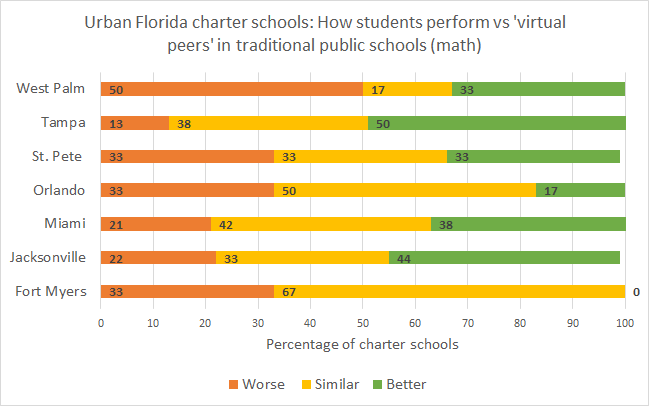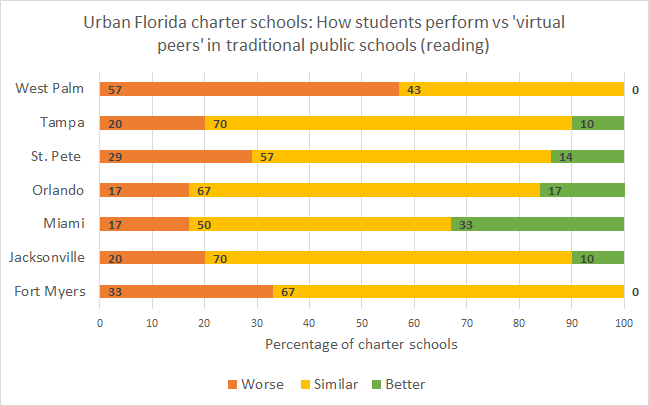Charter schools are having a growing, positive impact on student performance in cities around the country, according to a new study from researchers at the Center for Research on Education Outcomes, or CREDO, at Stanford University.
Yet the findings released Wednesday present a mixed bag in Florida, where charter schools' results varied from one city to the next, and in several cases fell short of urban charter sectors elsewhere or district schools in their communities.
CREDO researchers compared the learning gains of charter school students with similar students in traditional public schools. Unlike their previous, national studies, they looked exclusively at urban schools, focusing on 41 regions in 21 states and the District of Columbia.
The national results, based on student test scores from the 2006-07 through 2011-12 school years, show urban charter schools provided students the equivalent of about 40 additional days of learning each school year in math, and about 28 in reading, on average.
The numbers aren't as flattering for urban charter schools in the seven Florida cities covered by the study.
In Miami, one of the bright spots, the study found charter schools significantly outperformed traditional public schools in both reading and math. The charter school advantage there was especially strong among students in poverty and those learning English. Tampa charters showed a significant advantage over traditional public schools in math, and achieved similar gains to traditional schools in reading.
However, in two cities, Fort Myers and West Palm Beach, the study found charter schools significantly under-performed in both tested subjects.
Charters' results in Orlando, Jacksonville and St. Petersburg were more mixed. Because the researchers looked only at urban schools, this study doesn't paint a full picture of charter schools' results throughout the state.
The urban study used similar techniques to those employed in CREDO's two national charter studies from 2009 and 2013. A"virtual twin" approach helped control for student characteristics. Charter school students whose test scores were used in the study were paired with similar peers in traditional public schools to compare their learning gains.

The graph, based on Table 12 in in CREDO's "Urban Charter School Study," looks at the percentage of charter schools where students scored better than, similar to, or worse than district peers.

The graph, based on Table 13 in in CREDO's "Urban Charter School Study," looks at the percentage of charter schools where students scored better than, similar to, or worse than district peers.
Studies that looked at other student outcomes have found Florida's charter schools may have positive effects, like improved college attendance, that don't show up in their test scores.
The CREDO results might inform the state's efforts to improve charter school quality.
The authors of the study recommend a "sister city" approach, in which charters in one area draw on successes in another. Miami charters achieved some of their strongest results among English language learners, in both reading and math. The authors note that "cities like Orlando and Fort Myers can look to and learn from the success of Miami’s charter sector with ELL students, who see the equivalent of 112 additional days of learning per year in math relative to their peers in (traditional public schools)."
As the graphs in this post illustrate, West Palm Beach was one of just two cities in the country where students in at least half the urban charter schools studied showed lower learning gains than their "virtual peers" in traditional public schools. The study finds "an urgent need to address the primacy of academic rigor in the charter schools in these communities."
The results could help make the case for efforts to encourage high-performing charters to serve more disadvantaged students in Florida. Charters in the study generally had the stronger positive effects when they served more low-income students and more students of color.
This, the report notes, "suggests a focused model with continuing success in providing students who are often disenfranchised in local schools better opportunities to grow academically."
See more coverage from Education Week. Check out the study itself, and more detailed information for individual states, including Florida. We will continue exploring these results, and their implications, in follow-up posts.